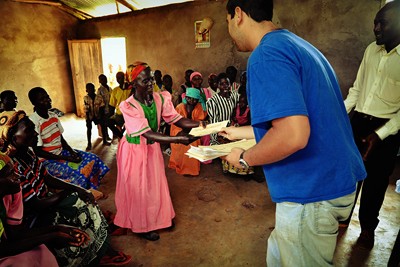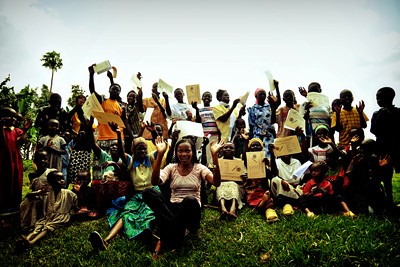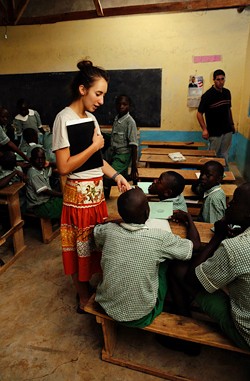Students learn power of information during Kenya trip
By Susan S. Lang
In Kenya, rural populations not only suffer from a high prevalence of severe anemia and protein-energy malnutrition but also from HIV/AIDS infection and a high infant and under-age-5 mortality. In Ithaca, N.Y., Cornell students are trying to help.
For the fourth year in a row, students have raised the funds to spend almost four weeks in Kenya to present a nutrition and HIV/AIDS education curriculum that they developed to rural residents in the Bungoma region of Kenya. This year, eight undergraduates in the student-run Cornell organization Enrich: Project Kenya (EPK) taught workshops in five different villages, Dec. 22-Jan. 17, covering general nutrition, nutrient deficiencies, food safety and hygiene, diarrhea/dehydration, breastfeeding and a nutritional approach to living longer, healthier lives for people with HIV/AIDS.
"Attendees ranged in age from 12 to the elderly," said Cheryl DuMond '11. At the end of each three-day program, participants took an exam and, upon passing, received a certificate from the Kenyan organization, Inter-Community Development Initiative (ICODEI), a nonprofit that EPK teams up with each year.
"Some of the effects of the seminar were immediately obvious," she added. "An elderly woman accustomed to raising chickens to sell the eggs, exclaimed how she planned to keep some for her family so her grandchildren could get enough protein each day to grow and develop properly."
In another instance, soon after one of the seminars, ICODEI received a call from a woman whose infant had diarrhea. "The woman was proud to say she now knew how to care for the infant during the illness," said DuMond.
This year, "We really expanded upon the work that had been done by the groups before us by distributing handouts in Kiswahili and including in the curriculum new preventative measures for parasites," said Zachary Lorsch '12, as well as a host of good agricultural techniques.
The group also edited their curriculum to start teaching in schools, said Sarah Shearer '12. They taught a brief lesson to children in a school as well as "taught a short segment on nutrition to people waiting to be seen at the clinic. We're also looking to make some changes to next year's trip by having the students train facilitators who can teach the program in our absence to make our program more sustainable."
She added that the after seeing people's "genuine desire for us to come back, I realize how much of a difference information can make."
The group, which is based at Cornell, is also working to see if they can expand the group to other universities so that their nutrition and HIV/AIDS program can be taught more frequently throughout the year.
Students interested in next year's trip can attend an informal information meeting at Libe Café, 7-9 p.m., Feb. 16; applications can be submitted until Feb. 24.
Media Contact
Get Cornell news delivered right to your inbox.
Subscribe

